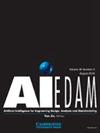Exploring the impact of set-based concurrent engineering through multi-agent system simulation
IF 2.3
3区 工程技术
Q3 COMPUTER SCIENCE, ARTIFICIAL INTELLIGENCE
Ai Edam-Artificial Intelligence for Engineering Design Analysis and Manufacturing
Pub Date : 2023-06-13
DOI:10.1017/S0890060423000112
引用次数: 1
Abstract
Abstract Set-based concurrent engineering (SBCE), a process that develops sets of many design candidates for each subproblem throughout a design project, proposes several benefits compared to point-based processes, where only one design candidate for each subproblem is chosen for further development. These benefits include reduced rework, improved design quality, and retention of knowledge to use in future projects. Previous studies that introduce SBCE in practice achieved success and had very positive future outlooks, but SBCE encounters opposition because its core procedures appear wasteful as designers must divide their time among many designs throughout the process, most of which are ultimately not used. The impacts of these procedures can be explored in detail through open-source computational tools, but currently few exist to do this. This work introduces the Point/Set-Organized Research Teams (PSORT) modeling platform to simulate and analyze a set-based design process. The approach is used to verify statements made about SBCE and investigate its effects on project quality. Such an SBCE platform enables process exploration without needing to commit many projects and resources to any given design.通过多智能体系统仿真探讨基于集合的并行工程的影响
基于抽象集的并行工程(SBCE)是一个为整个设计项目中的每个子问题开发多个候选设计集的过程,与基于点的过程相比,它提出了一些好处,在基于点的方法中,每个子问题只选择一个候选设计进行进一步开发。这些好处包括减少返工、提高设计质量以及保留知识以用于未来项目。先前在实践中引入SBCE的研究取得了成功,并对未来前景非常乐观,但SBCE遇到了反对,因为其核心程序似乎很浪费,因为设计师必须在整个过程中将时间分配给许多设计,其中大多数最终都没有使用。这些程序的影响可以通过开源计算工具进行详细探讨,但目前很少有这样的工具。本文介绍了点/集合组织研究团队(PSORT)建模平台,用于模拟和分析基于集合的设计过程。该方法用于验证关于SBCE的陈述,并调查其对项目质量的影响。这样的SBCE平台实现了过程探索,而无需将许多项目和资源投入到任何给定的设计中。
本文章由计算机程序翻译,如有差异,请以英文原文为准。
求助全文
约1分钟内获得全文
求助全文
来源期刊
CiteScore
4.40
自引率
14.30%
发文量
27
审稿时长
>12 weeks
期刊介绍:
The journal publishes original articles about significant AI theory and applications based on the most up-to-date research in all branches and phases of engineering. Suitable topics include: analysis and evaluation; selection; configuration and design; manufacturing and assembly; and concurrent engineering. Specifically, the journal is interested in the use of AI in planning, design, analysis, simulation, qualitative reasoning, spatial reasoning and graphics, manufacturing, assembly, process planning, scheduling, numerical analysis, optimization, distributed systems, multi-agent applications, cooperation, cognitive modeling, learning and creativity. AI EDAM is also interested in original, major applications of state-of-the-art knowledge-based techniques to important engineering problems.

 求助内容:
求助内容: 应助结果提醒方式:
应助结果提醒方式:


